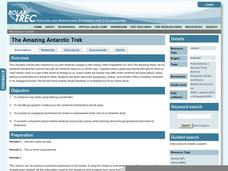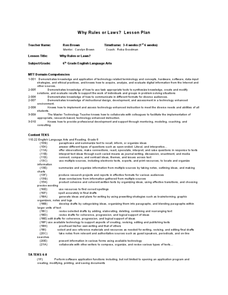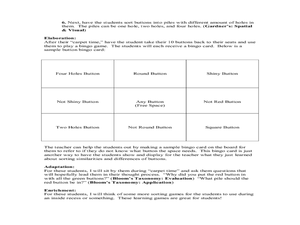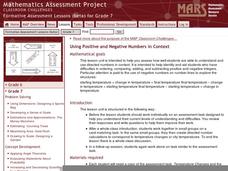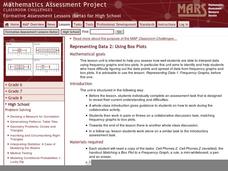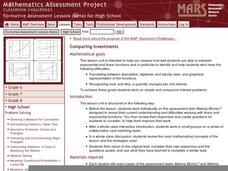Polar Trec
The Amazing Antarctic Trek
This resource provides two ways to engage learners in using latitude, longitude, and research skills. In pairs, or on their own, learners will locate several Antarctic regions on a map. They will write the name of the place and a few key...
Curated OER
Antibiotic Resistance
Students conduct an experiment to examine the effects of six different antibiotics on two different types of bacteria. They monitor Petri dishes with bacterial cultures and antibiotic soaked disks. They relate the bacteria growth...
Curated OER
Earth Day Unit Plan: Pollution in the Anacostia River - Biology Teaching Thesis
Sixth graders are able to explain that there are pollutants in the Anacostia River, what these pollutants can cause, and how to prevent further pollution. They examine the impacts that the pollutants of the Anacostia River could have on...
Curated OER
Nutrition -- A Lesson for Life - Biology Teaching Thesis
Students briefly explain the importance of nutrition in their everyday lives, and they tell you about how many calories they should consume in a day. They list readily available and affordable healthy foods that they LIKE to eat....
Curated OER
School Uniforms: Debating the Issue and Creating an Advertisement
Fifth graders debate the issue of school uniforms. They research, finding supporting evidence supporting their stance. Using the Lincoln-Douglas form of debate, 5th graders discuss the positive and negative issues of the topic. They...
Curated OER
Why Rules or Laws
Here’s a fresh approach to establishing classroom rules at the beginning of the school year. Class groups brainstorm what they know about rules for baseball, basketball, and football. They then consider how the games would differ without...
Curated OER
Sequencing
Are you looking for a way to teach sequence of events in your narrative writing unit? Bring this lesson to your middle school class, as it prompts young writers to create a narrative sequence map of events that have happened at school...
Curated OER
Bats
Use Stellaluna by Janell Canon to discuss bats and other types of animals. Learners identify the differences between bats and birds, list the traits of mammals, create a Bat Facts game, and go on a written scavenger hunt. Fun,...
Curated OER
Note-Taking: K.I.S.S. "Keep It Short and Simple"
Note-taking is an essential study skill, and it needs to be taught! In the context of a research project on energy sources, learners find multiple sources, evaluating, paraphrasing, and citing them correctly. Two lists with note-taking...
Curated OER
Move It Line Dance
The upbeat song "I Like to Move It" from the movie Madagascar is just the ticket! Get your younsters up and moving. The basic steps in this dance are the grapevine, side step, squat, back step, jumps, jumping jacks, and marching in...
American Chemical Society
Represent Bonding with Lewis Dot Diagrams
Lewis dot diagrams, Lewis dot structures, and electron dot diagrams are all the same thing. Young scientists learn how to draw Lewis dot diagrams and come to understand how dots and dashes represent valence electrons and ionic or...
EngageNY
Revision and Illustration: Strengthening the Writing in my Rainforest Field Journal and Adding a Labeled Drawing
Let me draw you a picture. Scholars read a quote from Roger Tory Peterson and discuss his views on drawings. They then create their own drawings of an ant or butterfly to add to their science journals.
Curated OER
Grouping Buttons
Looking for a good lesson plan on counting and sorting? This lesson plan is worth a look! In this classification lesson plan, learners sort buttons by color, shape, shiny verses not shiny, or number of holes.
Channel Islands Film
Once Upon a Time (Sa Hi Pa Ca): Lesson Plan 3
What was the most significant tool used by the Chumash? How did the environment make the tool possible? What group behaviors allowed the Chumash be be successful for thousands of years? After watching West of the West's documentary Once...
Curated OER
Skittles Galore!
Youngsters show understanding of accurate division of whole number, decimals, fractions, and percents using manipulatives (candies). They use white boards to demonstrate their understanding of representing numbers as defined in the...
Mathematics Assessment Project
Using Positive and Negative Numbers in Context
Measure the temperature of your math class with a temperature-based lesson on adding and subtracting rational numbers. The thermometer serves as a vertical number line for learners as they work together to solve a temperature change...
Curated OER
Proofs of the Pythagorean Theorem
Working individually and collaboratively, geometers gain a clear understanding of the Pythagorean theorem. They create, explain, and compare proofs of the theorem. Proofs involve areas of trapezoids, squares, and triangles, congruent...
Mathematics Assessment Project
Sampling and Estimating: Counting Trees
Your task today: count all the trees on a tree farm. To complete the assignment, learners first estimate the number of trees on a tree farm using random sampling. To improve their own response they then evaluate provided...
Curated OER
Biographical Poems
Students write a biographical poem about themselves. They observe a teacher-led demonstration, write an autobiographical poem and a biographical poem about a famous person using a template form, and display the poems side-by-side.
Ohio Department of Education
The Solution is Complex
Consider complex numbers, roots, and quadratic equations. Use the discriminate as a way to determine the nature of a quadratic's roots. Then discuss the similarities and differences between quadratics with two, one, or no real roots....
Curated OER
Double-Entry Journal Writing
Introduce your learners to the concept of a double-entry journal. Talk about how to connect with the text and model an example for them. Using whatever literature you are working with, have scholars choose a quote and make their own...
Curated OER
Representing Data 1: Using Frequency Graphs
Here is a lesson plan that focuses on the use of frequency graphs to identify a range of measures and makes sense of data in a real-world context as well as constructing frequency graphs given information about the mean, median, and...
Curated OER
Representing Data 2: Using Box Plots
What information can be gleaned from a box and whiskers plot? Discuss the five summary values - minimum, maximum, upper and lower quartiles, and median - and what conclusions can be made from these values? Included here is a matching...
Curated OER
Comparing Investments
Money, money, money. A complete lesson that makes use of different representations of simple and compound interest, including written scenarios, tables, graphs, and equations to highlight similarities and differences between linear and...
